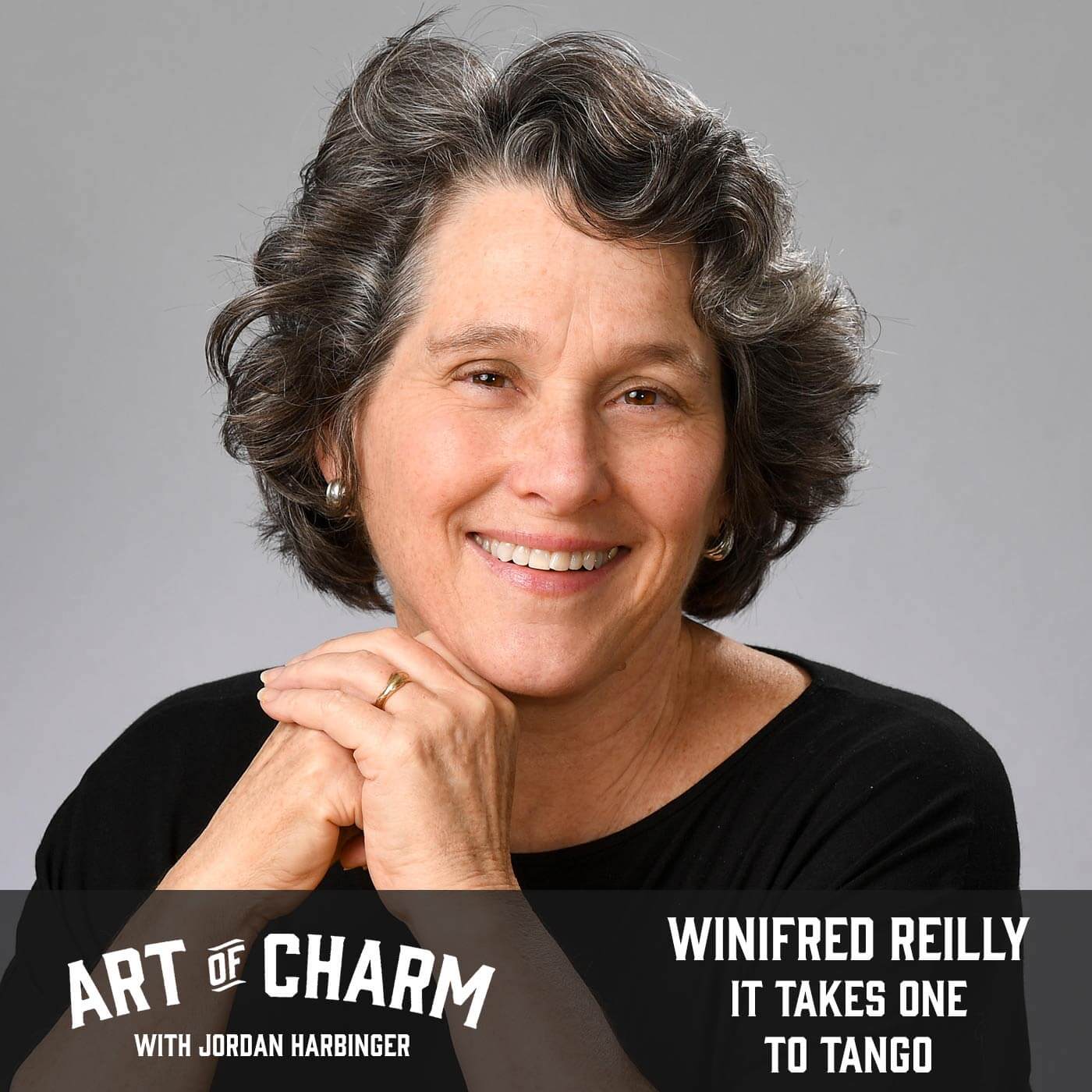Winifred Reilly (@winifredmreilly) has been a marriage and family therapist for nearly forty years, runs relationship blog Speaking of Marriage, and is the author of It Takes One to Tango: How I Rescued My Marriage with (Almost) No Help from My Spouse — and How You Can, Too.
“Somebody goes first — so let that person be you.” -Winifred Reilly
The Cheat Sheet:
- Why is the “it takes two to tango” concept flawed when it comes to relationships?
- Where does fairness go when we take responsibility upon ourselves to course correct a relationship?
- How are relationships like velcro?
- One belief about relationships that many people have backwards.
- It’s more important to know what to do when we disagree than trying to avoid disagreements altogether.
- And so much more…
[aoc-subscribe]
Couples hear all the time that change requires two people having a shared commitment to growth and that, for good things to happen, both partners must be willing to put both feet into the process. But what happens when one partner is fearful of change, has one foot out the door, or is convinced that the relationship is fine as it is? Should the more hopeful partner just call it quits?
Marriage and family therapist Winifred Reilly, author of It Takes One to Tango: How I Rescued My Marriage with (Almost) No Help from My Spouse — and How You Can, Too will try to help us make the paradigm shift from “it takes two” to “it takes me” — without feeling resentful or burdened, without settling, and without worrying whether our partner will match our effort. Listen, learn, and enjoy!
More About This Show
Anyone who’s ever been in a relationship has heard the phrase “it takes two to tango.” By this logic we’re led to believe that, in order for a relationship to work, both parties need to put equal effort toward its success or risk an imbalance that seals its doom.
But marriage and family therapist Winifred Reilly, author of It Takes One to Tango: How I Rescued My Marriage with (Almost) No Help from My Spouse — and How You Can, Too, says this concept is flawed. A relationship in the real world is almost never a 50/50 endeavor. “Most of the time it’s 40/60 or sometimes it’s 90/10,” she says.
So how did we come to believe in this flawed concept?
Having idealized — but unrealistic — role models like grandparents who were married for 75 years and swore they never had a day of trouble could be part of it. Or perhaps it’s our inherent desire for fairness that has us seeking a situation in which both parties pull equal weight. But if we’re really being honest with ourselves, we can’t expect every step to be perfect when we’re running a marathon. We’ll make it a lot further if we’re prepared for the occasional misstep without giving up on the whole race when it happens — and it will happen.
“There’s this idea that we’re supposed to have it go smoothly, so when things get rough — as they inevitably do — people think something is wrong,” says Winifred.
So then we deal with what we perceive to be wrong in a variety of ways. We reason that maybe we wound up with the wrong person and things would somehow be better if we were with someone else, so we break up or get divorced. Or maybe we give up on disagreement altogether and passively (and resentfully) let the other person call all the shots for the next 50 years because we abhor conflict and just want things to “work.” But these are just two ways of coping with imperfection from a perspective that the imperfection should not exist rather than an expectation that imperfection is just part of the package.
“Two people are not the same,” says Winifred. “Of course we’re going to run into trouble. We run into trouble with our neighbors, we run into trouble driving. So why would we not run into trouble in some way banging into our differences with a person who we’re trying to make a life together with?”
So rather than relying on the other person in a relationship to do their part in order to achieve some impossible balance, Winifred says we should take it upon ourselves to guide the relationship — not unlike past guest Jocko Willink’s concept of taking extreme ownership of a problem rather than passing the buck.
“That’s really what the one to tango idea is about,” says Winifred. “We don’t meet in the middle. We go as far as we need to go. We repeat ourselves. Let’s say your partner has had too much to drink and you’re about to get in the car. And every time you’ve always gotten in the car and you’ve held on to the door and you’ve prayed…and then one day you say, ‘I’m not getting in the car; give me the keys.’ And that person says, ‘I haven’t had too much to drink.’ And you either buckle at that moment, or you say, ‘Really. Give me the keys.’ And sometimes you hang in there, and it’s scary. That’s a moment where you’re not meeting in the middle. You’re going all the way.”
Listen to this episode of The Art of Charm in its entirety to learn more about why taking the leadership role in guiding a relationship back on course can be difficult — but preferable to the alternative, how Winifred has used her own advice to make her own marriage work (so it’s field-tested knowledge and not theoretical hocus pocus), why fairness doesn’t necessarily factor into what it takes to fix a relationship, how we grow by embracing our differences rather than trying to be perfectly symmetrical, how to overcome our brain’s instinct to preserve rather than challenge the status quo, how to identify what you’re really fighting about, the What’s True exercise, and lots more.
THANKS, Winifred Reilly!
If you enjoyed this session with Winifred Reilly, let her know by clicking on the link below and sending her a quick shout out at Twitter:
Click here to thank Winifred Reilly at Twitter!
Resources from This Episode:
- Transcript for Winifred Reilly | It Takes One to Tango (Episode 661)
- It Takes One to Tango: How I Rescued My Marriage with (Almost) No Help from My Spouse — and How You Can, Too by Winifred M. Reilly
- Worksheet for Winifred Reilly | It Takes One to Tango (Episode 661)
- Winifred Reilly’s website
- Speaking of Marriage
- Winfred’s column at Huffington Post
- Winifred Reilly at Facebook
- Winifred Reilly at Twitter
- 36 Things I Know After 36 Years of Marriage by Winifred M. Reilly, Huffington Post
You’ll Also Like:
- The Art of Charm Challenge (click here or text AOC to 38470 in the US)
- The Art of Charm Bootcamps
- Elite Human Dynamics
- Best of The Art of Charm Podcast
- The Art of Charm Toolbox
- The Art of Charm Toolbox for Women
- Find out more about the team who makes The Art of Charm podcast here!
- Follow The Art of Charm on social media: Instagram | Twitter | Facebook
On your phone? Click here to write us a well-deserved iTunes review and help us outrank the riffraff!




